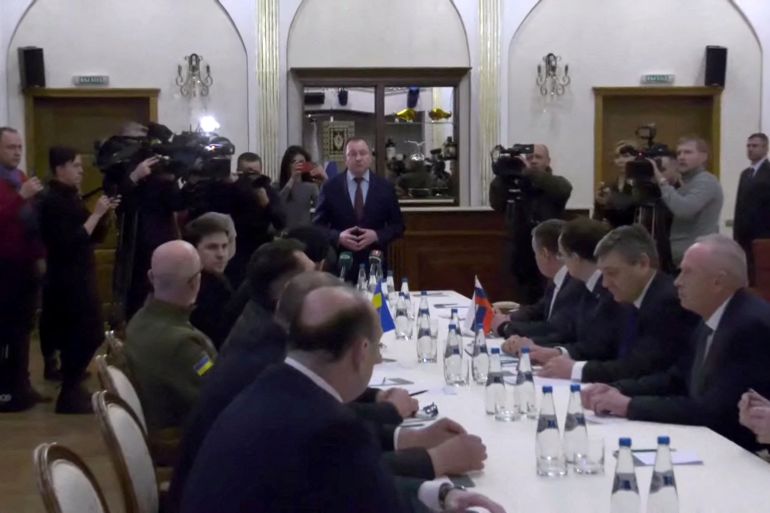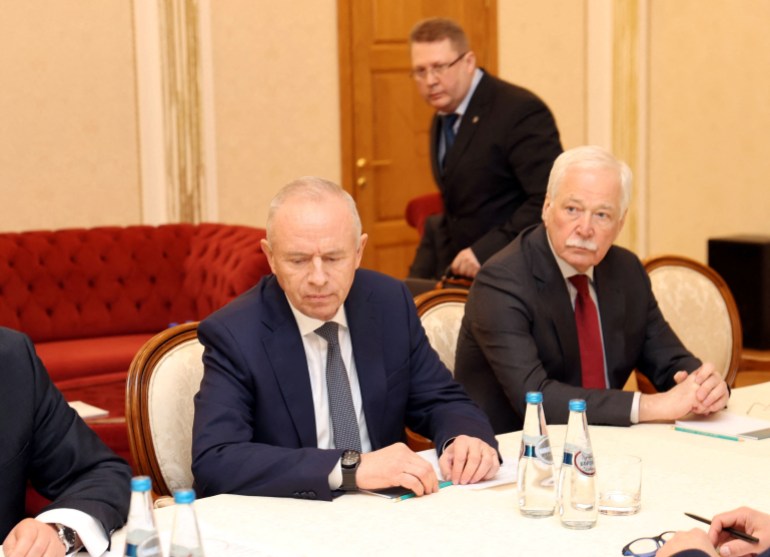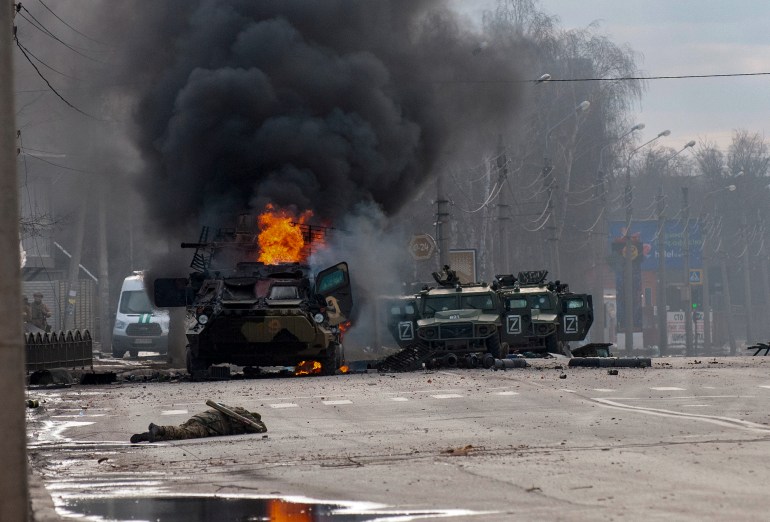No breakthrough at Ukraine talks as Russian assault continues
The talks took place after Russian forces bombarded residential areas in Ukraine’s second-largest city, Kharkiv.

The first round of Ukraine-Russia talks aimed at ending the fighting between Moscow and its neighbour have concluded with no immediate agreements.
The talks took place near the Belarus-Ukraine border on Monday as Russian troops continued their attack on Ukrainian cities – including the second-largest, Kharkiv – on the fifth day of Russia’s invasion.
Keep reading
list of 4 itemsEU warns Belarus opening door to Russian nukes after vote
Russia-Ukraine war: What is Putin’s endgame?
Stocks tumble as West intensifies sanctions on Russia
An aide to Russian President Vladimir Putin said talks with Ukrainian officials lasted nearly five hours.
Vladimir Medinsky, who headed the Russian delegation, said the two sides “found certain points on which common positions could be foreseen”. Another round of talks was agreed to, Medinsky said.

Mykhailo Podolyak, a top adviser to Ukrainian President Volodymyr Zelenskyy, gave few details except to say that the talks focused on a possible ceasefire and that a second round could take place “in the near future”.
“The next meeting will take place in the coming days on the Polish-Belarusian border, there is an agreement to that effect,” Medinsky said.
Al Jazeera’s Jonah Hull, reporting from Lviv in western Ukraine, said it was “no surprise” that a breakthrough hadn’t been reached, and there was “no sign that either side has moved their goalposts”.
“The two delegations came out of five hours of talks. The Russian and Ukrainian sides had identified some priority topics on which they have outlined certain decisions,” he added.
“It isn’t clear what those priority topics may be … but the Ukrainian side, they’re looking for an immediate ceasefire and the immediate withdrawal of Russian troops … and the Russian side, they’re looking for guarantees about Ukraine’s neutrality and that it would never join NATO.”
Russians bombard Kharkiv
Russian artillery bombarded residential districts of Kharkiv on Monday, killing at least 11 people, Ukrainian officials said.
Regional administration chief Oleg Synegubov said Russian artillery had pounded residential districts even though no Ukrainian army positions or strategic infrastructure were there. At least 11 people had been killed, he said.
“This is happening in the daytime, when people have gone out to the pharmacy, for groceries, or for drinking water. It’s a crime,” he said.

Earlier, Ukrainian Interior Ministry adviser Anton Herashchenko said Russian rocket strikes on Kharkiv on Monday had killed dozens of people. It was not possible to independently verify the casualty figures.
Moscow’s United Nations ambassador, speaking in New York, said the Russian army did not pose a threat to civilians.
There was fighting overnight around the port city of Mariupol, the head of the Donetsk regional administration, Pavlo Kyrylenko, said. He did not say whether Russian forces had gained or lost ground.
Russian forces seized two small cities in southeastern Ukraine and the area around a nuclear power plant, according to the Interfax News Agency.
The capital Kyiv remained under Ukrainian government control, with President Zelenskyy, dressed in military gear, encouraging his people with a series of defiant messages.
Explosions were heard in the city before dawn and Ukrainians set up checkpoints and blocked streets with piles of sandbags and tyres as they waited to take on Russian soldiers.
The Russian invasion – the biggest assault on a European state since World War II – has failed to make the decisive early gains that Putin would have hoped for.
The number of people fleeing Ukraine has surged to more than half a million, and at least 102 civilians have been killed since Moscow’s troops entered the country, according to the United Nations.
Macron, Putin call
French President Emmanuel Macron on Monday called on Russian leader Putin to spare civilians in Ukraine, the French leader’s office said in a statement.
Macron’s office said that in a 90-minute phone call he had asked the Russian leader to stop attacks against civilians and civilian infrastructure in Ukraine, and secure major roadways, in particular the road from the south of Kyiv.
“President Putin confirmed his willingness to make commitments on these three points,” the statement said.
Macron also “reiterated the demand of the international community to stop the Russian offensive against Ukraine, and reaffirmed the need to implement an immediate ceasefire”, the Elysee Palace said, but did not give the Russian leader’s response.
Macron also called on Putin to respect international humanitarian law, and allow aid shipments to reach the population, the statement said.
Meanwhile, Zelenskyy signed an application for his country to join the European Union, in a bid to solidify his country’s bond with the West.
The application was largely symbolic, however, as the process could take years. EU membership must be unanimously approved by all members.